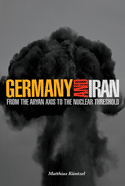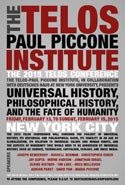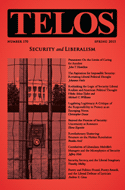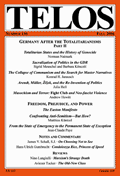By Telos Press · Wednesday, March 18, 2015  It’s a “special relationship.” But unlike the one embraced and enjoyed by the US and the UK, the nature of the relationship between Germany and Iran seems clandestine and sinister, and evokes strong feelings of suspicion and fear. In the new book, Germany and Iran: From the Aryan Axis to the Nuclear Threshold, respected political scientist and historian Matthias Küntzel examines the special connection between the “problem” countries of the past and present, and confronts the key issue of Iran’s achieving nuclear weapons capability and the real threat of danger that reality poses for Israel and the United States. It’s a “special relationship.” But unlike the one embraced and enjoyed by the US and the UK, the nature of the relationship between Germany and Iran seems clandestine and sinister, and evokes strong feelings of suspicion and fear. In the new book, Germany and Iran: From the Aryan Axis to the Nuclear Threshold, respected political scientist and historian Matthias Küntzel examines the special connection between the “problem” countries of the past and present, and confronts the key issue of Iran’s achieving nuclear weapons capability and the real threat of danger that reality poses for Israel and the United States.
Continue reading →
By Mohammad Rafi · Tuesday, March 17, 2015  An often referred to occasion when discussing Iran’s[1] relation to Nazi Germany is the 1939 establishment of a scientific German library consisting of 7,500 books in Tehran. The books were a gift from Nazi Germany as a building block in a continuing collaboration between Iran and Germany. This Deutsche Wissenschaftliche Bibliothek, as it was called, contained a variety of selections ranging from the works of the great German philosophers to books of technological nature. More telling than the choice of books provided is the preface to the library catalog ordered by one of the Nazi’s chief racial ideologues, Alfred Rosenberg. In this text he writes: “National Socialist Germany is consciously devoted to the facilitation of Aryan culture and history and sees in Iran’s efforts a striving towards mutual goals, that are to further the spiritual affinity of both nations” (Vorwort, DWB).[2] This “spiritual affinity” (geistige Verwandschaft) has to be viewed as part of a continuation of successful German cultural work or Kulturarbeit in Iran, which is precisely what needs to be explored to understand how this point was reached. However, we need to look at a part of Germany’s robust cultural efforts in the earlier decades of the 1900s, especially throughout the First World War, to allow us to better comprehend the roots of this spiritual alliance between Germany and Iran. An often referred to occasion when discussing Iran’s[1] relation to Nazi Germany is the 1939 establishment of a scientific German library consisting of 7,500 books in Tehran. The books were a gift from Nazi Germany as a building block in a continuing collaboration between Iran and Germany. This Deutsche Wissenschaftliche Bibliothek, as it was called, contained a variety of selections ranging from the works of the great German philosophers to books of technological nature. More telling than the choice of books provided is the preface to the library catalog ordered by one of the Nazi’s chief racial ideologues, Alfred Rosenberg. In this text he writes: “National Socialist Germany is consciously devoted to the facilitation of Aryan culture and history and sees in Iran’s efforts a striving towards mutual goals, that are to further the spiritual affinity of both nations” (Vorwort, DWB).[2] This “spiritual affinity” (geistige Verwandschaft) has to be viewed as part of a continuation of successful German cultural work or Kulturarbeit in Iran, which is precisely what needs to be explored to understand how this point was reached. However, we need to look at a part of Germany’s robust cultural efforts in the earlier decades of the 1900s, especially throughout the First World War, to allow us to better comprehend the roots of this spiritual alliance between Germany and Iran.
Continue reading →
 When Edward Snowden, on June 9, 2013, revealed his identity in a video interview posted on the website of the Guardian, he invoked the intellectual framework of liberalism in order to explain why he had leaked a massive trove of secret documents about the spying and data collection practices of the National Security Administration (NSA) and its partner agencies. Having regularly witnessed the legal abuses of the NSA as a technical assistant for the CIA and, subsequently, as an employee of the defense contractor Booz Allen Hamilton, Snowden explained that “over time [the] awareness of wrongdoing builds up and you feel compelled to talk about it . . . until eventually you realize that these things need to be determined by the public, not by somebody who’s simply hired by the government.” When Edward Snowden, on June 9, 2013, revealed his identity in a video interview posted on the website of the Guardian, he invoked the intellectual framework of liberalism in order to explain why he had leaked a massive trove of secret documents about the spying and data collection practices of the National Security Administration (NSA) and its partner agencies. Having regularly witnessed the legal abuses of the NSA as a technical assistant for the CIA and, subsequently, as an employee of the defense contractor Booz Allen Hamilton, Snowden explained that “over time [the] awareness of wrongdoing builds up and you feel compelled to talk about it . . . until eventually you realize that these things need to be determined by the public, not by somebody who’s simply hired by the government.”
Continue reading →
By Lewis West · Friday, March 13, 2015  Catastrophic history does not free society: it allows the individual no exit from an endless spiral of destruction. Such destruction promises liberation for some, but it only tilts the world closer to ever-greater annihilation. To place one’s hope in redemptive violence constitutes a leap into the absurd. It is an act of pure faith. This is how Julia Hell, in her essay “Remnants of Totalitarianism: Hannah Arendt, Heiner Müller, Slavoj Žižek, and the Re-Invention of Politics,” reads the apocalyptic politics of Müller and Žižek. Hell frames her critique with a rigorous practicality: she laments Žižek’s “empty terms,” and likewise she sees the political writings of Giorgio Agamben and Judith Butler as hopelessly vague (103). Yet Hell’s rejection of Müller and Žižek does not reflect an entirely pragmatic method. While Hell insists on the need for a usable, specific politics, her attentive readings of each thinker also point to a vast philosophical disagreement. In the end, the true debate is not over the applications of theory. It is instead over the answer to a single question: what is the relationship of politics to death? Catastrophic history does not free society: it allows the individual no exit from an endless spiral of destruction. Such destruction promises liberation for some, but it only tilts the world closer to ever-greater annihilation. To place one’s hope in redemptive violence constitutes a leap into the absurd. It is an act of pure faith. This is how Julia Hell, in her essay “Remnants of Totalitarianism: Hannah Arendt, Heiner Müller, Slavoj Žižek, and the Re-Invention of Politics,” reads the apocalyptic politics of Müller and Žižek. Hell frames her critique with a rigorous practicality: she laments Žižek’s “empty terms,” and likewise she sees the political writings of Giorgio Agamben and Judith Butler as hopelessly vague (103). Yet Hell’s rejection of Müller and Žižek does not reflect an entirely pragmatic method. While Hell insists on the need for a usable, specific politics, her attentive readings of each thinker also point to a vast philosophical disagreement. In the end, the true debate is not over the applications of theory. It is instead over the answer to a single question: what is the relationship of politics to death?
Continue reading →
By Kenneth Rasmussen · Thursday, March 12, 2015  Already in the first third of the 20th century, Karl Jaspers began formulating a philosophy that addressed the collapse of Enlightenment concepts of universal history and offered a perspective that could help us reformulate “universal history” as a viable concept. Jaspers’ work in this area is, I believe, underappreciated, and constitutes a realistic “cosmopolitan vision” that could help us address many of the thorny issues of global cultural conflict and diversity that we face today. Already in the first third of the 20th century, Karl Jaspers began formulating a philosophy that addressed the collapse of Enlightenment concepts of universal history and offered a perspective that could help us reformulate “universal history” as a viable concept. Jaspers’ work in this area is, I believe, underappreciated, and constitutes a realistic “cosmopolitan vision” that could help us address many of the thorny issues of global cultural conflict and diversity that we face today.
Continue reading →
By Telos Press · Monday, March 9, 2015 Here are a few more photos from the 2015 Telos Conference, held last month in New York City. We will be posting conference papers and a few videos in the near future, so stay tuned. Special thanks to our photographer/videographer Gabe Miller for capturing the conference on film.
Continue reading →
|
|
 It’s a “special relationship.” But unlike the one embraced and enjoyed by the US and the UK, the nature of the relationship between Germany and Iran seems clandestine and sinister, and evokes strong feelings of suspicion and fear. In the new book, Germany and Iran: From the Aryan Axis to the Nuclear Threshold, respected political scientist and historian Matthias Küntzel examines the special connection between the “problem” countries of the past and present, and confronts the key issue of Iran’s achieving nuclear weapons capability and the real threat of danger that reality poses for Israel and the United States.
It’s a “special relationship.” But unlike the one embraced and enjoyed by the US and the UK, the nature of the relationship between Germany and Iran seems clandestine and sinister, and evokes strong feelings of suspicion and fear. In the new book, Germany and Iran: From the Aryan Axis to the Nuclear Threshold, respected political scientist and historian Matthias Küntzel examines the special connection between the “problem” countries of the past and present, and confronts the key issue of Iran’s achieving nuclear weapons capability and the real threat of danger that reality poses for Israel and the United States.  An often referred to occasion when discussing Iran’s[1] relation to Nazi Germany is the 1939 establishment of a scientific German library consisting of 7,500 books in Tehran. The books were a gift from Nazi Germany as a building block in a continuing collaboration between Iran and Germany. This Deutsche Wissenschaftliche Bibliothek, as it was called, contained a variety of selections ranging from the works of the great German philosophers to books of technological nature. More telling than the choice of books provided is the preface to the library catalog ordered by one of the Nazi’s chief racial ideologues, Alfred Rosenberg. In this text he writes: “National Socialist Germany is consciously devoted to the facilitation of Aryan culture and history and sees in Iran’s efforts a striving towards mutual goals, that are to further the spiritual affinity of both nations” (Vorwort, DWB).[2] This “spiritual affinity” (geistige Verwandschaft) has to be viewed as part of a continuation of successful German cultural work or Kulturarbeit in Iran, which is precisely what needs to be explored to understand how this point was reached. However, we need to look at a part of Germany’s robust cultural efforts in the earlier decades of the 1900s, especially throughout the First World War, to allow us to better comprehend the roots of this spiritual alliance between Germany and Iran.
An often referred to occasion when discussing Iran’s[1] relation to Nazi Germany is the 1939 establishment of a scientific German library consisting of 7,500 books in Tehran. The books were a gift from Nazi Germany as a building block in a continuing collaboration between Iran and Germany. This Deutsche Wissenschaftliche Bibliothek, as it was called, contained a variety of selections ranging from the works of the great German philosophers to books of technological nature. More telling than the choice of books provided is the preface to the library catalog ordered by one of the Nazi’s chief racial ideologues, Alfred Rosenberg. In this text he writes: “National Socialist Germany is consciously devoted to the facilitation of Aryan culture and history and sees in Iran’s efforts a striving towards mutual goals, that are to further the spiritual affinity of both nations” (Vorwort, DWB).[2] This “spiritual affinity” (geistige Verwandschaft) has to be viewed as part of a continuation of successful German cultural work or Kulturarbeit in Iran, which is precisely what needs to be explored to understand how this point was reached. However, we need to look at a part of Germany’s robust cultural efforts in the earlier decades of the 1900s, especially throughout the First World War, to allow us to better comprehend the roots of this spiritual alliance between Germany and Iran.  When Edward Snowden, on June 9, 2013, revealed his identity in a video interview posted on the website of the Guardian, he invoked the intellectual framework of liberalism in order to explain why he had leaked a massive trove of secret documents about the spying and data collection practices of the National Security Administration (NSA) and its partner agencies. Having regularly witnessed the legal abuses of the NSA as a technical assistant for the CIA and, subsequently, as an employee of the defense contractor Booz Allen Hamilton, Snowden explained that “over time [the] awareness of wrongdoing builds up and you feel compelled to talk about it . . . until eventually you realize that these things need to be determined by the public, not by somebody who’s simply hired by the government.”
When Edward Snowden, on June 9, 2013, revealed his identity in a video interview posted on the website of the Guardian, he invoked the intellectual framework of liberalism in order to explain why he had leaked a massive trove of secret documents about the spying and data collection practices of the National Security Administration (NSA) and its partner agencies. Having regularly witnessed the legal abuses of the NSA as a technical assistant for the CIA and, subsequently, as an employee of the defense contractor Booz Allen Hamilton, Snowden explained that “over time [the] awareness of wrongdoing builds up and you feel compelled to talk about it . . . until eventually you realize that these things need to be determined by the public, not by somebody who’s simply hired by the government.”  Catastrophic history does not free society: it allows the individual no exit from an endless spiral of destruction. Such destruction promises liberation for some, but it only tilts the world closer to ever-greater annihilation. To place one’s hope in redemptive violence constitutes a leap into the absurd. It is an act of pure faith. This is how Julia Hell, in her essay “Remnants of Totalitarianism: Hannah Arendt, Heiner Müller, Slavoj Žižek, and the Re-Invention of Politics,” reads the apocalyptic politics of Müller and Žižek. Hell frames her critique with a rigorous practicality: she laments Žižek’s “empty terms,” and likewise she sees the political writings of Giorgio Agamben and Judith Butler as hopelessly vague (103). Yet Hell’s rejection of Müller and Žižek does not reflect an entirely pragmatic method. While Hell insists on the need for a usable, specific politics, her attentive readings of each thinker also point to a vast philosophical disagreement. In the end, the true debate is not over the applications of theory. It is instead over the answer to a single question: what is the relationship of politics to death?
Catastrophic history does not free society: it allows the individual no exit from an endless spiral of destruction. Such destruction promises liberation for some, but it only tilts the world closer to ever-greater annihilation. To place one’s hope in redemptive violence constitutes a leap into the absurd. It is an act of pure faith. This is how Julia Hell, in her essay “Remnants of Totalitarianism: Hannah Arendt, Heiner Müller, Slavoj Žižek, and the Re-Invention of Politics,” reads the apocalyptic politics of Müller and Žižek. Hell frames her critique with a rigorous practicality: she laments Žižek’s “empty terms,” and likewise she sees the political writings of Giorgio Agamben and Judith Butler as hopelessly vague (103). Yet Hell’s rejection of Müller and Žižek does not reflect an entirely pragmatic method. While Hell insists on the need for a usable, specific politics, her attentive readings of each thinker also point to a vast philosophical disagreement. In the end, the true debate is not over the applications of theory. It is instead over the answer to a single question: what is the relationship of politics to death? 

